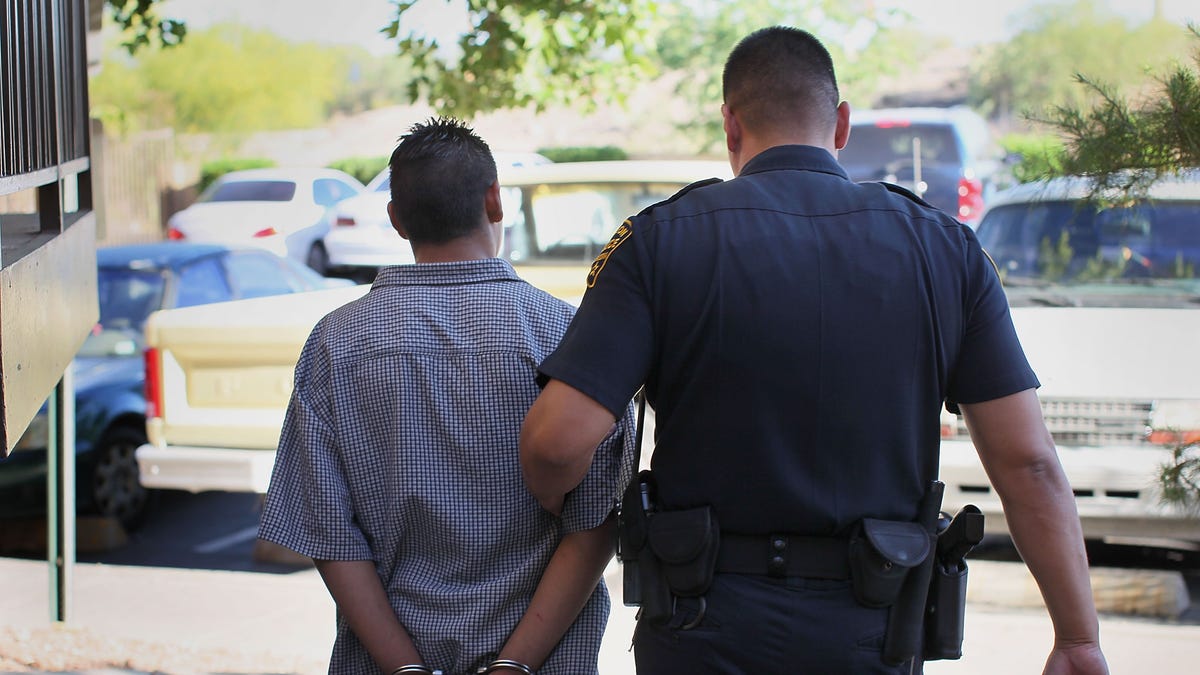
TUCSON, AZ - MAY 29: Tucson Police Officer Angel Ramirez takes a juvenile offender into custody after discovering a felony warrant for a probation violation May 29, 2010 in Tucson, Arizona. Ramirez works in the city's predominately Hispanic south side. The Tucson Police Department is currently gearing up to begin training its officers on the implementation of the controversial new immigration law SB 1070. Although a Tucson police officer was one of the first to file suit in federal court challenging the new law, most rank and file officers tend to support the legislation while the Arizona Chiefs of Police have criticized it. (Photo by Scott Olson/Getty Images) (2010 Getty Images)
A war on sanctuary cities is on around the country.
Several states are about to pass laws targeting sanctuary cities, which protect undocumented immigrants from deportation. North Carolina, Michigan and Texas are among the states working on passing laws that take aim at sanctuary cities.
North Carolina appears close to having a law that seeks to end the practice, and punish cities that are seen as not cooperating with the federal government in identifying and deporting people who are here illegally. Republican Gov. Pat McCrory is expected to sign into law this month.
State Rep. George Cleveland, a Republican who is the main force behind the bill, told USA Today that his measure finally got support after the death of a San Francisco woman, Kathryn Steinle, at the hands of an undocumented man who was freed from jail and not transferred into the custody of immigration officials.
"Everyone says, 'It's a federal government problem.' No, it isn't. The federal government is not doing its job, so it's our problem," Cleveland said, according to USA Today. "We've become so multiculturalist that we don't have the common sense to see that we're ruining our country. Instead, we let cities pat (undocumented immigrants) on the back and here we are."
Steinle’s death also has been the catalyst for a U.S. House of Representatives bill that passed in July cracking down on sanctuary cities. The Senate could take the bill up soon.
Those who support sanctuary cities say Steinle’s death should be a reason to review, not do away with, sanctuary cities.
Sam Liccardo, Democratic mayor of San Jose, believes some regions in the U.S. are being overzealous.
"Innovative regions of the world depend on ambitious, creative people who come from other parts of the world to contribute to our economy," said Liccardo to USA Today. "I think cities that become viewed as hostile toward immigrants will ultimately be forced to rethink their approach."
Sanctuary cities came about as a response to federal programs that relied on local police to identify undocumented immigrants.
The fingerprints of people arrested in local communities were forwarded to the Department of Homeland Security to check whether they had immigration violations.
But critics of those programs said immigration officials were too assertive in rounding up people who were not a threat to society, instead of focusing on more dangerous deportable immigrants.
Some 300 communities across the country adopted a form of the “sanctuary cities” approach.
Many cities and counties are reassessing their policy after the San Francisco fatal shooting.
But many officials want them to be scaled down, if not eliminated.
"As a father of two children, I could only imagine how that felt," said Mike Kowall, a Republican state senator from White Lake, Mich., according to USA Today. "The fact that this fellow was locked up and obviously there were other warrants for him, but he wasn't turned over to ICE to sort it all out, it was really disturbing."
Kowall filed a bill banning sanctuary policies by any government in Michigan.
The bill is progressing through the state legislature and could pass this year.
Texas state Sen. Charles Perry, a Republican, also wants to crack down on sanctuary cities.
He says the Steinle murder converted many Texas lawmakers who were once opposed to targeting sanctuary cities.
"The initial response was partisan. That's a given in this political environment," Perry said to USA Today. "But the big picture here is the rule of law. When you allow cities to undermine federal immigration law, you create a scenario ... that can create chaos and anarchy, because who's to say what laws should be enforced?”
"One way or another, we'll get this done," he added.




